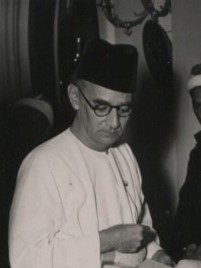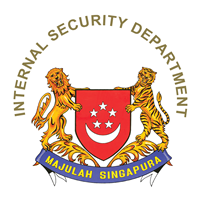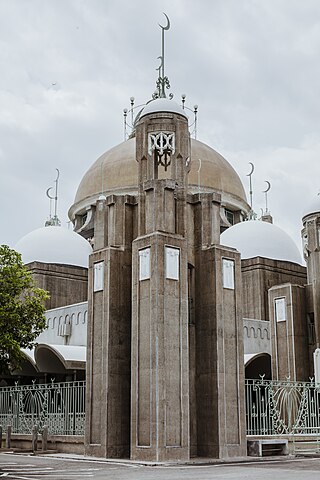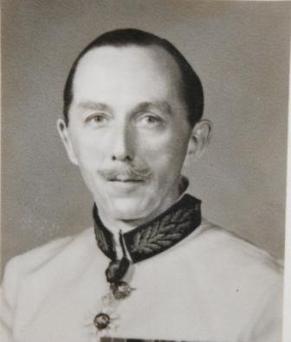
Klang or Kelang, officially Royal City of Klang, is a city, royal city and former capital of the state of Selangor, Malaysia. It is located within the Klang District. It was the civil capital of Selangor in an earlier era prior to the emergence of Kuala Lumpur and the current capital, Shah Alam. Port of Port Klang, which is located in the Klang District, is the 12th busiest transshipment port and the 12th busiest container port in the world.

Sultan Hisamuddin Alam Shah Al-Haj Ibni Almarhum Sultan Alaeddin Sulaiman Shah was Sultan of Selangor from 1938 to 1942, later from 1945, and the second Yang di-Pertuan Agong of the Federation of Malaya from 14 April, until his death on 1 September 1960.

Tan Sri Khoo Teck Puat was a banker and hotel owner, who, with an estimated fortune of S$4.3 billion (US$3,195,953,500), was the wealthiest man in Singapore at one point. He owned the Goodwood Group of boutique hotels in London and Singapore and was the largest single shareholder of the British bank Standard Chartered. The bulk of his fortune came from shares in Standard Chartered, which he bought up in the 1980s to help thwart Lloyds Bank's proposed acquisition which many financiers deemed hostile. The Goodwood Park Hotel in Singapore, built in 1900, is a restored historic landmark.
The Most Honourable Order of the Crown of Johor is an Order of chivalry awarded by the Sultan of Johor. It was first instituted on July 31, 1886.

Dato' Sir Onn bin Dato' Jaafar was a Malayan politician who served as the 7th Menteri Besar of Johor from 1947 to 1950. His organised opposition towards the creation of the Malayan Union led him to form the United Malays National Organisation (UMNO) in 1946; he was UMNO's founder and its first president until his resignation in 1951. He was famously known as the pioneer of organised anti-imperialism and early Malay nationalism within Malaya, which eventually culminated with the Malayan independence from Britain. He was also responsible for the social and economic welfare of the Malays by setting up the Rural Industrial Development Authority (RIDA).

The Internal Security Department (ISD) is the domestic intelligence, counter-espionage, counterterrorism, and primary security agency of Singapore under the purview of the Ministry of Home Affairs (MHA). It is tasked to confront national security threats ranging from subversion or sedition, foreign influence, spying or espionage, domestic or international terrorism, and political or racial/religious extremism.

The term "British Malaya" loosely describes a set of states on the Malay Peninsula and the island of Singapore that were brought under British hegemony or control between the late 18th and the mid-20th century. Unlike the term "British India", which excludes the Indian princely states, British Malaya is often used to refer to the Federated and the Unfederated Malay States, which were British protectorates with their own local rulers, as well as the Straits Settlements, which were under the sovereignty and direct rule of the British Crown, after a period of control by the East India Company.

Sultan Sulaiman Royal Mosque is Selangor's royal mosque, which is located in Klang, Selangor, Malaysia. It was constructed by the British in the early 1932 and was officially opened in 1933 by the late Almarhum Sultan Sir Alaeddin Sulaiman Shah.
This article lists important figures and events in Malayan public affairs during the year 1958, together with births and deaths of significant Malayans.
This article lists important figures and events in Malayan public affairs during the year 1954, as well as births and deaths of significant Malayans.

The Mahmoodiah Royal Mausoleum is a Royal Mausoleum of Johor located at Bukit Mahmoodiah in Jalan Mahmoodiah, Johor Bahru, Malaysia. The first Sultan of Johor buried here was Sultan Abu Bakar in 1895. Besides that, the founder of UMNO, Dato' Onn Jaafar was buried next to his father, Dato Jaafar bin Muhammad's grave.

Abdul Mubin Sheppard, born Mervyn Cecil ffrank Sheppard, pen name M. C. ff Sheppard, was a Malaysian World War II veteran and prisoner of war, as well as a renowned historian and academic.

Sir Han Hoe Lim was a Singaporean physician and politician.
David Joseph Murnane (1892–1953) was Singapore's longest serving municipal water engineer, serving from 1925 to 1947.
This article lists important figures and events in the public affairs of British Malaya during the year 1932, together with births and deaths of prominent Malayans.
The following is an alphabetical list of articles related to Selangor.

Sultan Ibrahim Shah ibni Almarhum Sultan Salehuddin Shah was the second Sultan of Selangor. He served as sultan from 1782 until his death in 1826.
Ahmad Perang was the second chairman of the Election Commission of Malaysia. He became the first Malayan Railway manager among the Malays.
Chia Keng Hock was a Singaporean footballer who played as a striker.










